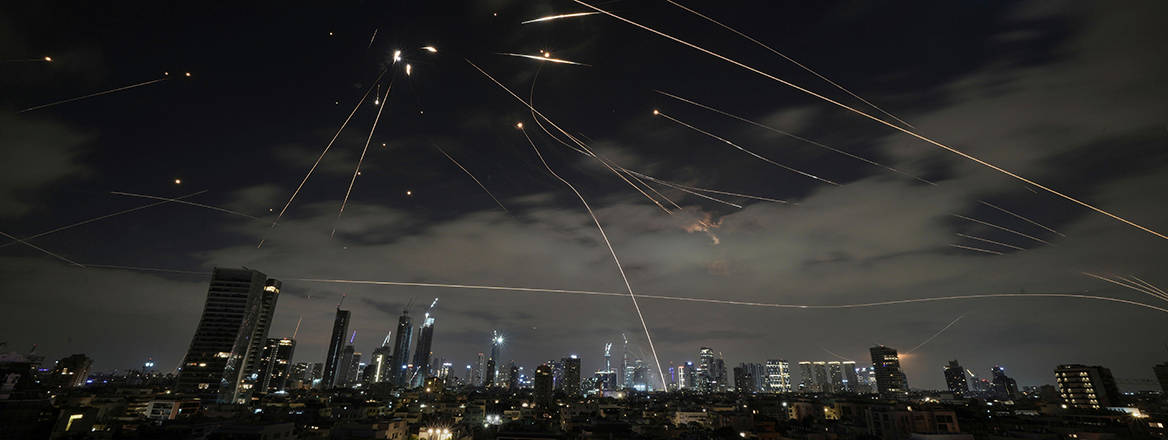Both Iran and Israel have good reason to see the current conflict as existential, with few remaining mediators deemed reliable to effect de-escalation.
On Friday 13 June, Israel launched an audacious attack against Iran, combining waves of targeted air strikes with covert sabotage operations to land simultaneous blows to Iran’s nuclear facilities, missile sites, radar defence systems, nuclear scientists and military commanders.
Iran has responded by launching drones and hundreds of ballistic missiles at Israel (most, but not all, of which have been intercepted), vowing more ‘severe punishment,’ as Israel warned that its own attacks on Iran would continue for days or weeks. With the long simmering shadow war now fully out in the open, the region is bracing for further escalation with uncertain repercussions across and beyond the Middle East.
Why Now?
Israeli Prime Minister Benjamin Netanyahu has sought to neutralise Tehran’s nuclear capabilities for years, viewing a nuclear Iran as an existential threat to Israel, and publicly opposing any deals or negotiations with the Islamic Republic – including the talks undertaken by the US this spring. Israel in the past has sought to curb Iran’s nuclear programme with targeted assassinations of nuclear scientists and sophisticated cyber attacks. But Netanyahu has frequently advocated for a large-scale military option.
This operation, dubbed ‘Rising Lion,’ was developed in the autumn of 2024, following limited tit-for-tat strikes between Israel and Iran last October in which Israel managed to strike Iran’s air defence systems and other military targets. This was combined with Israel severely weakening Hezbollah, the largest Iran-backed militant group, in Lebanon, and largely depleting its arsenal, which had previously served as a de-facto deterrent.
What matters most now is perception, and the US will be viewed as complicit in this attack, largely because US/Iran negotiations over the nuclear programme were ongoing
Israel intended to launch the attack earlier in the spring, while both Iran and its Axis of Resistance allies remained relatively weak, and crucially, before Iran opened a new, deeper underground nuclear facility designed to withstand attacks from US bunker-buster bombs. Israel postponed the operation when US President Donald Trump opened nuclear talks with Iran, but opted to act after the talks reached their two-month mark, even as negotiations were ongoing.
Is Iran a Nuclear Threat?
Iran has claimed that its nuclear programme is for peaceful purposes only. But Iran has long been enriching uranium at well above civilian levels, accelerating after Trump pulled out of the Joint Comprehensive Plan of Action (JCPOA), or nuclear deal, in 2018. Recent assessments indicate that Iran has rapidly increased both its stockpile of uranium and its levels of enrichment, reducing its breakout time – the time needed to convert highly enriched uranium into a nuclear weapon – to less than a year. In addition, the International Atomic Energy Agency (IAEA), the UN’s atomic watchdog, last week declared that Iran is not complying with obligations of nuclear non-proliferation, and estimated that Iran has enough enriched uranium for nine nuclear bombs. Still, international analysts, including the US intelligence community, agree that Iran has not yet weaponised.
What is the US Role?
The US was quick to distance itself from the initial Israeli strikes, with Secretary of State Marco Rubio emphasising that the US was not involved; indeed, the Trump administration had previously told Israel that they would not participate directly in a military operation. This was consistent with previous US administrations (including former President Joe Biden’s), which have been wary of supporting Israeli strikes in Iran, even as the US is believed to have the only bombs capable of hitting Iran’s underground nuclear facilities.
US concerns have centered on the fear that such attacks could damage but not destroy Iran’s nuclear capabilities, potentially accelerating the programme or pushing it further underground. Furthermore, Washington has worried that Iran or its proxies would retaliate by striking US military bases or other American assets in the region, potentially drawing it into a wider conflict. Trump added his personal ‘dealmaker’ brand to the calculus, repeatedly signaling a preference for a negotiated solution rather than a military one.
Regardless of Trump’s intentions however, what matters most now is perception, and the US will be viewed as complicit in this attack, largely because US/Iran negotiations over the nuclear programme were ongoing. At best, the US will be seen as giving Israel a ‘plausible denial green light’ to undertake the operation. At worst, the talks will be viewed as intentional cover for Israel to land a surprise blow; this perception could have serious ramifications for US diplomacy more broadly, including on Gaza. Meanwhile, Trump has added fuel to the fire by subsequently calling Israel’s strikes ‘excellent’ and warning Iran of ‘more to come,’ seemingly seeking credit for an attack he publicly opposed. As the situation escalates, it is uncertain how far Washington will get involved, whether by choice or necessity.
How will Iran Respond?
Iran has been operating from a weakened position since the last salvo with Israel, and the initial operation on Friday further exposed Tehran’s vulnerabilities. But just as Israel views this war as existential, so too does Iran, and it is unlikely to quickly admit defeat or return to negotiations with the US after what it sees as an unprovoked attack by Israel.
In addition to launching hundreds of ballistic missiles at Israel over the weekend, Tehran has threatened to attack American, French, and British bases in the region – though Iran knowingly would struggle to defend itself militarily against international retaliation. Iran is also reportedly mulling closing the Strait of Hormuz, a key shipping route that transports about a quarter of the world’s oil and one fifth of global liquefied natural gas (LNG). And while Iran’s allied militant groups in the region may be weakened, they can still cause significant disruption, especially the Houthis in Yemen who launched nearly 500 attacks on Israel and ships in the Red Sea between October 2023 and April 2025. Iran could also seek to align with other groups in the region, including Al Qaeda affiliates with whom Tehran has recently developed relations.
Perhaps most worrying, if Netanyahu’s gamble backfires, the operation could push Iran to accelerate its nuclear capabilities and officially withdraw from the Nuclear Non-Proliferation Treaty (NPT), potentially setting off an arms race in the region. This depends largely on the extent to which Israel fully destroys, rather than just damages, Iran’s nuclear infrastructure, particularly the Fordo site which is deep underground. As for Netanyahu’s appeals to Iranians to ‘rise up’ against the Islamic Republic, the operation will likely have the opposite rally-around-the-flag effect, especially if there continue to be civilian casualties.
What Does this Mean for Gaza?
The attacks are already having the effect of distracting from the ongoing war in Gaza, and relaxing pressure on Israel to ease the humanitarian crisis that is devastating the Strip. The escalating hostilities will also further complicate efforts to reach a ceasefire deal and hostage release. Some have suggested that striking a blow against Iran may give Netanyahu the political manoeuvrability to accept a compromise in Gaza. But given that Israel views Iran as the ‘head of the snake’ for groups like Hamas, it is more likely that Netanyahu will see the defeat of both actors as inextricably linked. On the other side, there is a strong chance that Hamas will lose any remaining faith in negotiating with Trump’s special envoy Steve Witkoff (who also led the Iran talks), if it perceives that Tehran was deceived by the US. As for the broader Israel-Palestine conflict, the attacks have already led to the postponement of a highly anticipated UN conference set to be hosted by France and Saudi Arabia this week to advance a two-state solution.
Though described by Netanyahu as a ‘pre-emptive strike,’ Israel’s operation has unleashed a war at a highly fraught time in the region with no foreseeable end game. The UK’s Keir Starmer and other world leaders have rightly called for de-escalation. But in a conflict which both Israeli and Iranian leaders view as existential, and with limited options for credible mediators, the region is preparing for a long and dangerous road ahead.
© RUSI, 2025.
The views expressed in this Commentary are the authors', and do not represent those of RUSI or any other institution.
For terms of use, see Website Terms and Conditions of Use.
Have an idea for a Commentary you'd like to write for us? Send a short pitch to commentaries@rusi.org and we'll get back to you if it fits into our research interests. View full guidelines for contributors.
WRITTEN BY
Dr Julie Norman
RUSI Senior Associate Fellow, International Security
- Jim McLeanMedia Relations Manager+44 (0)7917 373 069JimMc@rusi.org




